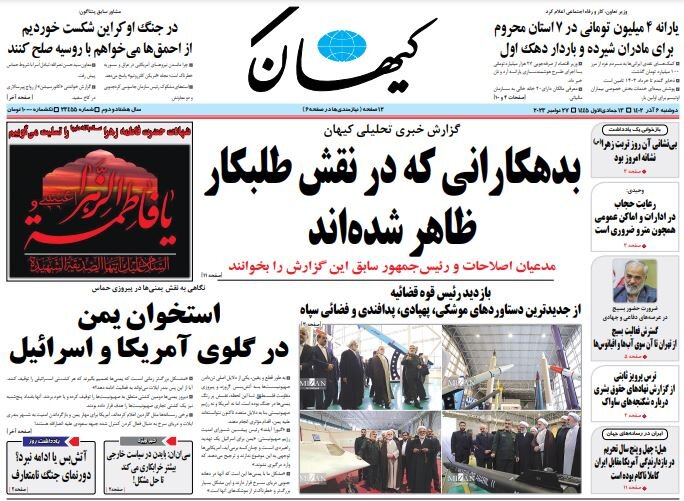U.S. sanctions failed to defeat Iran

In a commentary, Kayhan addressed the claim of the analytical news site Hill about the failure of the U.S. in deterring Iran and said: Deterrence is only possible if the Biden administration targets the strategic assets of the Islamic Republic.
Otherwise, Iran's strategy to create a gap between the United States and Israel could succeed. Iran is not afraid of America despite its capabilities. Therefore, when Israel conducts military operations against Iran in Syria and Iraq and conducts covert operations against nuclear facilities, Iran in turn targets American forces in the Middle East [West Asia] in its double proxy war with Israel. In simple words, America has become Iran's representative to take revenge on Israel. Showing military determination by directly and severely punishing Iran will force this country to drastically change its strategy. Forty-five years of sanctions has limited the capabilities of the Islamic Republic, but it has completely failed to deter it. If the United States does not apply deterrence, the Islamic Republic will continue to escalate its proxy attacks, and possibly succeed in creating a gap between Washington and Tel Aviv.
Vatan-e-Emrooz: Europe's open and closed eyes on human rights
In an analysis, Vatan-e-Emrooz dealt with the issue of a resolution against Iran by the European Parliament. It wrote: While all eyes around the world are focused on the war of the Zionist terrorist regime against the people of Gaza, the European Parliament continued its anti-Iranian projections and issued a resolution under the pretext of human rights issues in Iran. The European Parliament has thought about human rights issues in Iran in a situation where the Zionist regime, one of the main allies of the European Union, according to experts and all the people of the world, is committing war crimes in Gaza and occupied Palestine. In this situation, instead of investigating and issuing a resolution against the crimes of the Zionist regime, the European representatives are thinking about some dual-nationality or foreign prisoners in Iran who are imprisoned in Iran for various crimes, including espionage and anti-security measures. Westerners have one eye open and one eye closed when facing human rights; wherever their interests demand it, they open their eyes and claim human rights, and wherever it does not benefit them, they close their eyes to the worst human crimes.
Iran: Tehran's central role in the exchange of prisoners
In a note, the Iran newspaper addressed the important role of Iran in the exchange of captives between Gaza and Israel and wrote: Many analysts at the peak of efforts to stop the Gaza war during the past weeks have pointed to the formation of the triangle of Iran, Qatar and Egypt, especially in establishing a temporary ceasefire and facilitating the exchange of civilian prisoners; an effort that does not mean condoning the crimes of Tel Aviv in the past weeks, but it is a serious step to get Israel to face a strong barrier that has been formed under the shadow of the convergence of Iran and the Arab countries of the region. Although the exchange of prisoners has taken place within the framework of a short-term pause in the Gaza war, the efforts of the Islamic Republic of Iran continue in the process of peace negotiations to stop the war comprehensively until reaching an acceptable point for the resistance front. Raisi's stances in his recent interview with regional media and his emphasis on consensus-building operations in Islamic countries to achieve the rights of the Palestinian nation and prevent oppression, aggression and occupation by the Zionists are examples of these efforts.
Etemad: The unsolvable puzzle of the "new Middle East" for Biden
In an article, Etemad addressed the U.S. position on the situation in West Asia. It wrote: Washington preferred Iran to remain as an isolated country outside the international order. While Washington was looking to create a "new Middle East" without considering the interests, talents and role of the axis of resistance in the region, the surprising operation of the Al-Aqsa storm changed all the equations. Just a few hours after the October 7 operation, many experts and reputable Western think tanks wrote about the possibility of stopping the Iran-U.S. nuclear talks and postponing the normalization of Saudi-Israeli relations for an indefinite period. In recent years, America has tried to achieve a kind of stable balance through communication with one of the blocs in the region. If America intends to achieve a kind of stable balance and deterrence in West Asia, it must first recognize the role of Iran and the axis of resistance as an important and influential actor. The resumption of the nuclear negotiations should be accompanied by constructive actions on the part of Washington with the aim of "recovering" strategic coordination with Tehran.
Leave a Comment